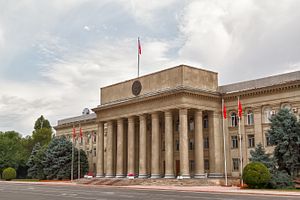In Kyrgyzstan’s October 4 elections six parties cleared the threshold to enter parliament. A month after the election, three parties have joined with the Social Democratic Party (SDPK), which President Almazbek Atambayev asked to form a coalition.
The SDPK emerged from the election victorious, winning 38 seats in the 120-member parliament. Though the SDPK’s victory was clear, it did not gain a majority and thus had to form a coalition in order to form a government. Joining the SDPK in the majority coalition are the Kyrgyzstan party (18 seats), Onuguu-Progress (13) and Ata-Meken (11).
According to Eurasianet, “The coalition is larger than any in the last term of parliament. No single party can collapse the government by unilaterally exiting the coalition, which was a regular threat last time round.” This should ensure a degree of parliamentary stability.
The remaining two parties, Respublika-Ata Jurt (28 seats) and Bir Bol (12 seats), will sit in opposition. Respublika-Ata Jurt is a new party, formed by the merger of Respublika and Ata Jurt, which both sat in the previous parliament.
The coalition nominated former Prime Minister Temir Sariyev to retain the post he’s held since April 2015. Sariyev was the fifth prime minister selected in five years; his predecessor, Djoomart Otorbaev, lasted about a year in the position. Several Kyrgyz prime ministers have fallen victim to continued difficulties and scandals in relation to the Kumtor gold mine. Otorbaev was preceded by Zhantoro Satybaldiyev, whose majority coalition collapsed in early 2014 after Ata-Meken withdrew from the coalition, saying in a statement that “Satybaldiyev has exhausted his moral and political outfit and can no longer occupy this high political post.” Satybaldiyev had repeatedly rejected calls to nationalize the troublesome gold mine, which was mired in corruption, and was accused by Ata-Meken of corruption and abuse of office.
Kumtor remains a sore spot, but Kyrgyzstan’s challenges are broader than the mine. The country’s economy has taken a hit as a result of Russia’s downturn. A significant number of Kyrgyz migrants work in Russia. Bishkek’s entrance into the Eurasian Economic Union (EEU) earlier this year hasn’t seemed to yield the economic rewards some hoped for, but might complicate matters for Kyrgyz businesses that specialize in re-exporting Chinese goods. Further, the Kyrgyz parliament is likely to address sooner rather than later a series of controversial laws — on “anti-gay propaganda” and “foreign agents” — that the last parliament began debating but did not pass or reject.
While the new majority coalition is large enough to assuage most fears of sudden collapse, Kyrgyz politics remain convoluted (Eurasianet has an excellent detailed summary of some of the nuances). This complexity is compounded by the scheduled 2017 presidential election. While the election is almost two years away, the background jockeying to replace Atambayev — who by law cannot run for a second term — has already begun.

































